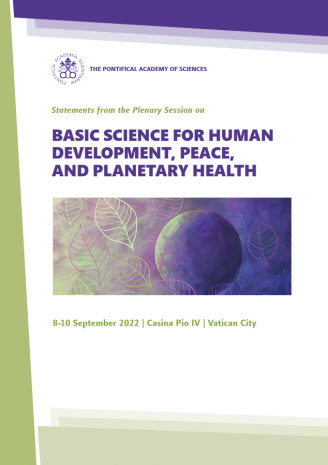The 2022 Plenary of the Pontifical Academy of Sciences explored and highlighted the driving forces and opportunities related not just to basic science per se, but to basic science for human development, peace and planetary health. The topic is also timely in view of the United Nations’ “International Year of Basic Sciences for Sustainable Development”. There are certain key areas where basic science is going to improve human welfare directly, such as medicine, food sys- tems, energy and more. Progress is also happening in interdisciplinary science building on strong basic science, such as: Mathematics and AI; Astronomy; Physics and Biophysics; Climate Science; Chemistry / Bio-Chemistry; Life Sciences and Medical Science. The fact that important discoveries do not come about because of a goal, but because of curiosity and imagination as a result of wonder and admiration, raises philosophical, ethical, religious, and science policy questions. We thus noted the importance and benefits of long-term perspectives in science, and called for society – including faith-based communities – and policy to recognize and more strongly support basic sciences. We emphasize that it is ever more important for science to have peace as a goal. As scientists, we must neither neglect the fundamental drivers of conflicts, nor ignore the role of science. The Pontifical Academy of Sciences remains concerned about neglect or ignorance of science-informed rational arguments and science skepticism in parts of the general public and in conventional and social media. The abovementioned powerful contributions of basic science and its related capacities need to be shared more equita- bly – especially by the rich nations – with low-income regions of the world.

